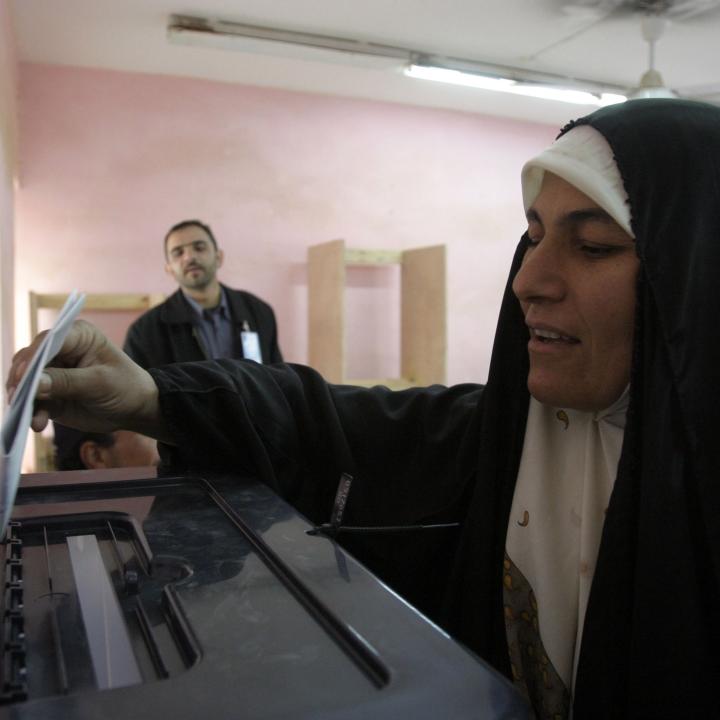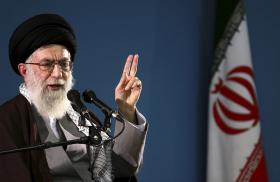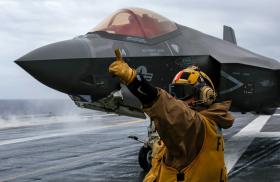
- Policy Analysis
- Fikra Forum
Between the Promise of Democracy and Repeated Failures of Iraq’s Electoral System

Twenty years on from the fall of Saddam Hussein, Iraq continues to suffer from a deep crisis in the practice of its democracy.
Twenty years on from the fall of Saddam Hussein, Iraq continues to suffer from a deep crisis in the practice of its democracy. Elections, designed as a peaceful means of renewing political legitimacy, building the state, and representing the will of voters, have been transformed in Iraq into a facade used to consolidate influence and exchange positions within a ruling system defined by corruption. Democracy is not just a technique for choosing leaders, it must also be accompanied by values—and institutions that protect those values—in order to be effective.
Iraq’s Electoral Failures
Iraq lacks the basic mechanisms for free and fair elections; chief among them is the state’s inability to prevent paramilitary use of force. The proliferation of arms in Iraq is a direct threat to voters, the electoral commission, and candidates; during election season, it is used as a tool of political pressure. In Iraq’s most recent parliamentary elections in 2021, the Sadrist bloc of popular Shia cleric Muqtada al-Sadr won a plurality of seats in parliament. However, it was unable to form a coalition government due to pressure from armed forces affiliated with the Iranian-backed Shia Coordination Framework (CF). The Sadrists, in an unprecedented move, attempted to form a government without the CF by pursuing a majoritarian coalition with Sunnis and Kurds rather than a consensus parliamentary coalition that included the CF. These efforts resulted in armed clashes between the CF and Sadrist parties inside the Green Zone in Baghdad, claiming the lives of dozens of young people.
Money injected into election campaigns plays a no less dangerous role in Iraq. In 2021, the Supreme Court ruled against any limits on contributions to financial campaigns. As such, politicians of all stripes use their financial resources to buy votes and link the economic prospects of their respective constituencies to their political success. Political discourse has become inundated with advertisements for grandiose populist programs that lack details or practical solutions to constituents’ real problems. That rhetoric simultaneously crowds out reformist political figures who seek to upend the political status quo.
The reformists are sidelined from Iraqi politics because they cannot compete with the clientelism that keeps larger parties afloat, and are therefore deprived of funding and support. This ultimately disincentivizes other reform-minded Iraqis from engaging in politics. The same parties that participate in patronage at the grassroots level also control ministries and government institutions, allowing them to exploit state resource flows. In the absence of effective oversight or real accountability, government money too easily finds its way into electoral propaganda or is earmarked to passpolitical agendas throughout the Iraqi political system.
At the popular level, Iraqis have been unable to effect a peaceful transfer of power either through the ballot box or even when they were obliged to take to the streets en masse. The resignation of former Prime Minister Adel Abdul Mahdi in 2019 was not the result of a constitutional mechanism or a response to the demands of the Tishreeni protests. Abdul-Mahdi left only when Iraq’s highest religious authority in Najaf, Shia cleric Ali al-Sistani, issued a rare political statement that "the parliament from which the current government emerged is called upon to reconsider its choices in this regard and to act as dictated by the interest of Iraq and the preservation of the blood of its children, and to avoid its slide into a spiral of violence, chaos and destruction.”
Meanwhile, the reformist parties that remained could have presented themselves as a convincing alternative by capitalizing on popular anger and the decline in street confidence regarding traditional parties. Yet the opposite happened; most of the new political parties that entered parliament after the Tishreeni protests failed to present a different model for politics in Iraq. Some of their deputies quickly became involved in alliances with the same parties they had been criticizing, undermining their lofty rhetoric. Even more failed to define their approach to the political system: did their platform represent a veritable departure from Iraq’s politics-as-usual, or did it intend to reproduce the status quo with mild adjustments? Without clarity on this key question, the new parties saw a marked decline in favorability, increased frustration, and a renewed popular conviction that there is no difference between the new and the old.
Crisis of Popular Participation
In light of these apparent failures of the Iraqi electoral system, Iraqis are demonstrating a lack of confidence in their country’s electoral process through declining participation rates. With each electoral cycle, the High Electoral Commission has recorded figures below 41 percent, with participation dropping below 30 percent in some governorates. Even this percentage only includes valid electoral cardholders—not the total population of potentially eligible voters. Participation rates of all potential Iraqi voters are thus much lower than the official estimates.
Declining voter participation suggests general popular frustration with electoral options in Iraq, given the widely understood role of armed state and non-state actors and unregulated money in politics. Citizens who repeatedly see that their vote makes no difference when the electoral outcomes favor those with weapons, money, and external support will lose interest in a meaningless gesture. What Iraqi politics needs are independent leaders who can present a viable alternative to the status quo. Without them, Iraqi citizens will remain cynical about their political system.
Democracy, in its essence, is not just about ballot boxes. It is essential that it be accompanied by the free exchange of ideas, an integrated system of laws, a peaceful transfer of power, and respect for the popular will. In Iraq, many of these elements are absent, making the electoral process a formal practice that does not reflect the essence of democracy. This is made even clearer by the many political decisions resolved outside the walls of parliament and outside of the country’s voting mechanisms. This renders the electoral process a rubber stamp to legalize what has already been agreed upon behind the scenes.
Reform from Within or Intervention from Without?
There is little doubt that democracy is the safest and most effective method for bringing about change and reform in a manner that guarantees the rights of all citizens. However, it is important to draw attention to the basis of this political system. The political class that has been running Iraq since 2003 established itself as a result of foreign interventions, and still derives part of its legitimacy and support from international and regional actors. Thus, attempts at radical reform from within the system have met stiff resistance because those external forces will work at all costs to preserve their position of influence.
The most prominent of those foreign powers is Iran, which now depends more deeply on its regional proxies in Iraq since Hezbollah, Hamas, and Assad’s Syria have all been either completely eliminated or severely weakened over the past year. Consequently, Tehran’s support for Iraqi militias is crucial to Iranian national security and strategic interests, especially in the context of renewed U.S.-Iranian nuclear negotiations. Because of the increased importance that Iraq’s militias now have in Tehran, some believe that the country will not be able to reform its political system with internal pressure alone. In this view, external intervention would be the only way to push the Iraqi political system towards reform, or at least force it to make concessions that pave the way for a real democratic transition.
Considering Iraq’s internal options, the future of democracy in Iraq lies in the country’s ability to reform the electoral process from its roots. To address the repeated failures in the electoral process in Iraq, radical reforms must be adopted. Controlling unrestrained weapons and ending the dominance of armed militias over political decisions is vital to ensuring a safe and neutral environment that encourages the participation of voters and candidates. Campaign financing must also be monitored, and strict legislation passed to hold accountable those involved in buying votes or illegally influencing voters. Lastly, safeguards should be established to guarantee that state resources are not siphoned for electoral purposes by influential parties. All of these efforts should be complemented with legislation to ensure the independence of the High Electoral Commission and provide it with the technical and professional support it needs to perform its role as established in the Iraqi Constitution.
Reformist parties should also be supported and given equal opportunities in media and funding, in parallel with spreading electoral awareness to promote a culture of participation among citizens, especially youth. Finally, there must be a commitment to the peaceful transfer of power, respect for election results, and an independent judiciary to interpret the constitution in accordance with the rule of law. These are difficult conditions to implement. Yet without them, elections will remain a perfunctory political ritual used to renew a false sense of legitimacy. Democracy is not just a means to power, but a social contract based on respect for the popular will of the people, equality before the law, and accountability. These vital aspects of democracy are, unfortunately, still absent in Iraq.



